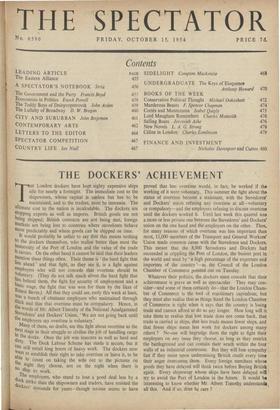THE DOCKERS' ACHIEVEMENT
IrFIF London dockers have kept eighty expensive ships idle for nearly a fortnight. The immediate cost to the shipowners, whose capital is useless but has to be maintained, and to the traders, must be immense. The ultimate cost to the nation is incalculable. The dockers are stopping exports as well as imports. British goods are not being shipped; British contracts are not being met; foreign Markets are being lost to countries where stevedores behave More predictably and where goods can be shipped on time. It would probably be unfair to say that this means nothing to the dockers themselves, who realise better than most the immensity of the Port of London and the value of the trade it carries. On the other hand it cannot be said that their leaders mention these things often. Their theme is ' the hard fight that lies ahead ' and that fight, as they see it, is a fight against employers who will not concede that overtime should be .v.oluntary. (They do not talk much about the hard fight that lies behind them, the fight for security of employment and a basic wage, the fight that was won for them by the likes of Ernest Bevin.) All that they could see, early this week at least, Was a bunch of obstinate employers who maintained through thick and thin that overtime must be compulsory. Hence, in the words of Mr. Albert Timothy of the National Amalgamated Stevedores' and Dockers' Union, ' We are not going back until the employers say overtime is voluntary.' Many of them, no doubt, see this fight about overtime as the next stage in their struggle to civilise the job of handling cargo In the docks. Once the job was insecure as well as hard and crtY. The Dock Labour Scheme has made it secure, but it Can still entail long hours of heavy work. The dockers now Want to establish their right to take overtime or leave it, to be Ile to count on taking the wife out to the pictures on thenight they choose, not on the night when there is no ship to work. . The employers, who stand to lose a good deal less by a dock strike than the shipowners and traders, have resisted the dockers' demands for years—though no-one seems to have proved that less overtime would, in fact, be worked if the working of it were voluntary. This summer the tight about the status of overtime became a stalemate, with the Stevedores' and Dockers' union refusing any overtime at all—voluntary or compulsory—and the employers refusing to discuss overtime until the dockers worked it. Until last week this quarrel was a more or less private one between the Stevedores' and Dockers' union on the one hand and the employers on the other. Then, for many reasons of which overtime was less important than most, 11,000 members of the Transport and General Workers' Union made common cause with the Stevedores and Dockers. This meant that the 8,000 Stevedores and Dockers had succeeded in crippling the Port of London, the busiest port in the world and used by a high percentage of the exporters and importers of the country '—as the Council of the London Chamber of Commerce pointed out on Tuesday.
Whatever their politics, the dockers must concede that their achievement is grave as well as spectacular. They may con- sider—and some of them certainly do—that the London Cham- ber of Commerce is the tool of reactionary capitalism; but they must also realise that as things stand the London Chamber of Commerce is right when it says that the country is losing trade and cannot afford to do so any longer. How long will it take them to realise that lost trade does not come back, that trade is carried in ships, that less trade means fewer ships, and that fewer ships mean less work for dockers among many others ? No-one will begrudge them the right to fight their employers on any issue they choose, as long as they restrict the battleground and can contain their wrath within the four walls of an industrial courtroom. But they will lose sympathy fast if they insist upon undermining British credit every time their anger overcomes them. Every foreign merchant whose goods they have delayed will think twice before Buying British again. Every shipowner whose ships have been delayed will try to avoid the Port of London in the future. It would be interesting to know whether Mr. Albert Timothy understands, all this. And if so, does he care ?


































 Previous page
Previous page